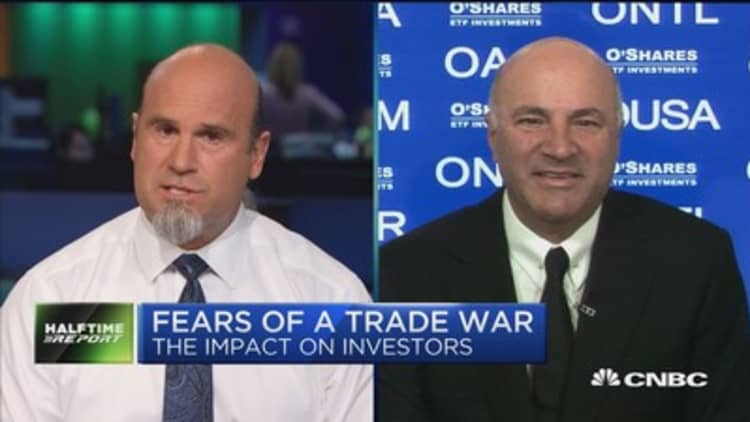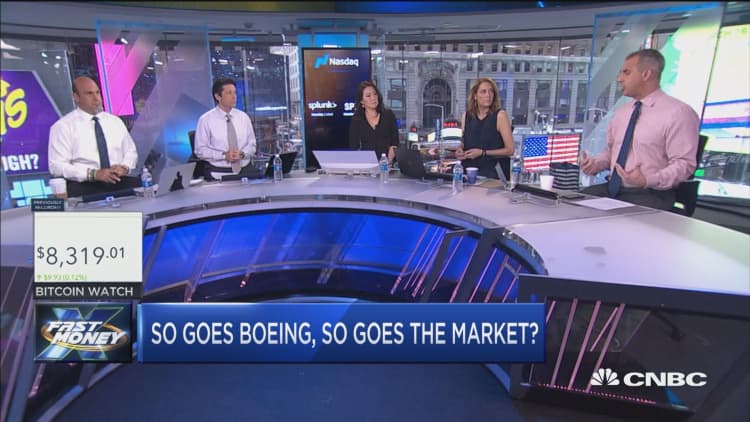
The Dow Jones industrial average fell Wednesday as Boeing shares pulled back on worries the U.S. could engage China in a trade war.
The 30-stock index lost 248.91 points at 24,758.12 after opening up more than 100 points. Boeing dropped 2.5 percent, contributing the most to the Dow's decline. The Dow fell as much as 338 points earlier in the session.
Boeing's decline comes after a report said President Donald Trump wishes to slap $60 billion of tariffs on Chinese goods. Investors feared China could target the aerospace giant in retaliation.
The closed 0.6 percent lower at 2,749.48 amid weak performances in materials, financials and consumer staples companies. The index also dipped below its 50-day moving average, a key technical level.
"The technical undercurrent of the market persists and in the event we close beneath the 50-day moving average," said Jeff Kilburg, CEO of KKM Financial. "In the event we close beneath the 50 day moving average, the conviction of the recent longs will be tested."
Utilities stocks jumped, with the Utilities Select Sector SPDR Fund (XLU) climbing 1 percent. The fund also posted its first five-day winning streak since late November.
The Nasdaq composite slipped 0.2 percent at 7,496.81 as shares of Apple declined 0.9 percent.
"This volatility is the norm not the exception now," said Art Hogan, chief market strategist at B. Riley FBR. "It's the perception of what tariffs mean ... right now we're focused on significant tariffs on Chinese goods."
A source told CNBC on Tuesday that Washington is contemplating a trade package that would include investment restrictions, indefinite tariffs and potentially even visa restrictions on Chinese travelers.
Trump tweeted on Wednesday: "We cannot keep a blind eye to the rampant unfair trade practices against our Country!"
Asian equities declined, with the Nikkei 225 falling 0.87 percent and the Shanghai composite dropping 0.57 percent. In Europe, the Stoxx Europe 600 rose 0.1 percent as corporate news helped lift the major indexes.
Last week, Trump signed two declarations to impose tariffs on steel and aluminum imports — both are expected to take effect in the coming weeks. While Canada and Mexico are exempt from the deal, fears over a potential trade war remain, as investors worry that countries around the world may impose their own retaliatory tariffs.
Stocks came off their lows after CNBC reported that Trump is planning to name CNBC contributor Larry Kudlow as the next director of the National Economic Council. Boeing shares also rebounded following the news.
The moves Wednesday come after a choppy trading day Tuesday, with the Dow closing down more than 150 points, the index's worst session since March 1. Tech shares helped lead the declines, with the sector dropping more than 1 percent.
"Certainly the stock market is being supported by the economy and earnings being in double digits this year," said Bruce Bittles, chief investment strategist at Baird. "I'd say the one problem area is the technical situation and that the rally is getting more narrow ... That would suggest we may have another retest of the February lows before this is all over."
But as for political news on trade and a possible trade war, Bittles said that those worries are likely "overstated."
In economic news, the Commerce Department said retail sales declined for a third straight month as households curbed purchases of cars and other expensive items. Economists had been expecting sales to rise 0.3 percent. The SPDR S&P Retail ETF (XRT) fell 0.6 percent.
Meanwhile, U.S. producer prices increased slightly more than expected in February. The Department of Labor said on Wednesday that its producer price index rose 0.2 percent last month; economists polled by Reuters had expected PPI gaining 0.1 percent.
So-called core PPI — which excludes volatile food, energy and trade service prices — rose 0.4 percent.
"It's kind of a mixed bag. You've got retail sales missing expectations and PPI and business inventories coming in line," said Randy Frederick, vice president of trading and derivatives at Charles Schwab. "We seem to be in a consolidation phase this week."
In corporate news, Ford Motor Company's stock gained 2.2 percent after Morgan Stanley upgraded the company to overweight from underweight. The bank sees more potential in the American motor vehicle company following "significant changes" to senior management at the company and its efforts to improve its global portfolio.
Shares of Qualcomm closed 0.7 percent higher in choppy trade after Broadcom announced that it is formally ending its hostile bid for the American chipmaker. Qualcomm stock fell nearly 5 percent Tuesday after Trump ordered Broadcom to abandon the deal.
Yields on 10-year Treasurys fell to 2.817 percent Wednesday in New York, their lowest level since early March. Yields move inversely to prices.
—CNBC's Gina Francolla contributed to this report.
WATCH: So goes Boeing, so goes the market?


